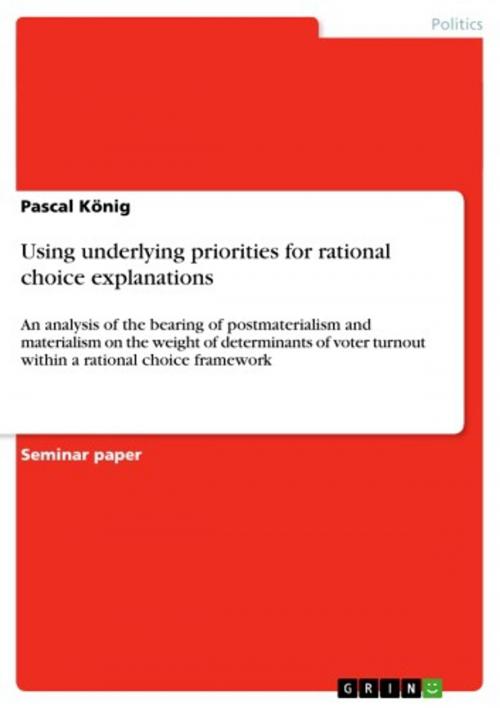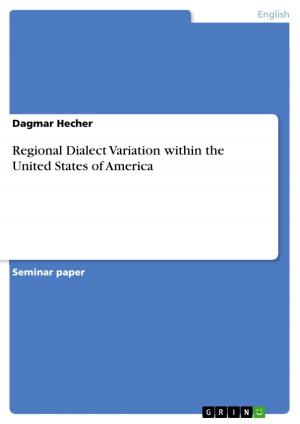Using underlying priorities for rational choice explanations
An analysis of the bearing of postmaterialism and materialism on the weight of determinants of voter turnout within a rational choice framework
Nonfiction, Social & Cultural Studies, Political Science, International, Foreign Legal Systems| Author: | Pascal König | ISBN: | 9783640662876 |
| Publisher: | GRIN Publishing | Publication: | July 16, 2010 |
| Imprint: | GRIN Publishing | Language: | English |
| Author: | Pascal König |
| ISBN: | 9783640662876 |
| Publisher: | GRIN Publishing |
| Publication: | July 16, 2010 |
| Imprint: | GRIN Publishing |
| Language: | English |
Seminar paper from the year 2009 in the subject Politics - Political Systems - General and Comparisons, grade: 1,0, University of Mannheim, language: English, abstract: This enquiry deals with the shortcomings of rational choice theory in explaining voter turnout as a rational - i.e. efficient in terms of costs and benefits - act. It is argued that intrinsic benefits, i.e. benefits that accrue to the citizen independent of an election outcome, should provide a proper explanatory potential if one can account for different implications of these benefits for different voters. The rationale should hold for benefits in general, though. Underlying coherent priorities in the form of political values (materialism vs. postmaterialism) are used to differentiate voters and to probe for differing impacts of determinants of voter turnout depending on different underlying values. The thesis is that the impacts of these determinants differ for different values. The tested determinants, taken from the literature, are appreciation of democracy, social norms, party identification and material resources. Hypotheses about impacts are formulated on the basis of the theory of political values for every determinant and tested by means of logistic regression employing data from German election studies. Whereas the impacts of social norms and material resources vary by underlying values, the results for appreciation of democracy and party identification remain inclusive.
Seminar paper from the year 2009 in the subject Politics - Political Systems - General and Comparisons, grade: 1,0, University of Mannheim, language: English, abstract: This enquiry deals with the shortcomings of rational choice theory in explaining voter turnout as a rational - i.e. efficient in terms of costs and benefits - act. It is argued that intrinsic benefits, i.e. benefits that accrue to the citizen independent of an election outcome, should provide a proper explanatory potential if one can account for different implications of these benefits for different voters. The rationale should hold for benefits in general, though. Underlying coherent priorities in the form of political values (materialism vs. postmaterialism) are used to differentiate voters and to probe for differing impacts of determinants of voter turnout depending on different underlying values. The thesis is that the impacts of these determinants differ for different values. The tested determinants, taken from the literature, are appreciation of democracy, social norms, party identification and material resources. Hypotheses about impacts are formulated on the basis of the theory of political values for every determinant and tested by means of logistic regression employing data from German election studies. Whereas the impacts of social norms and material resources vary by underlying values, the results for appreciation of democracy and party identification remain inclusive.















